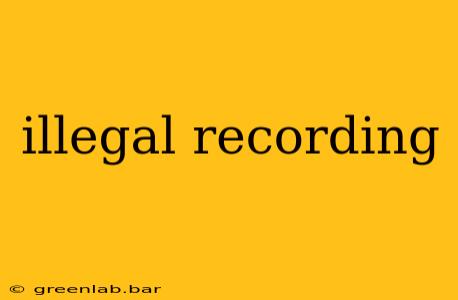Recording someone without their knowledge or consent is a serious offense with significant legal implications. This comprehensive guide explores the complexities of illegal recording, covering various aspects of the law, potential penalties, and how to protect yourself from becoming a victim.
What Constitutes Illegal Recording?
The legality of recording conversations varies considerably depending on location and specific circumstances. Generally, "illegal recording" refers to the act of capturing audio or video without the informed consent of all parties involved. This isn't simply a matter of ethics; it's a violation of privacy laws in many jurisdictions. Key aspects to consider include:
-
One-Party Consent vs. Two-Party Consent States: In some states (one-party consent states), only one participant in a conversation needs to be aware of the recording for it to be legal. In others (two-party consent states), all parties must consent. Knowing your state's laws is crucial. This is often a point of confusion, leading to accidental violations.
-
Public vs. Private Spaces: Recording in public spaces generally carries fewer legal restrictions than recording in private settings, such as homes or private offices. However, even in public, focusing on individuals without their knowledge might still be considered harassment or invasion of privacy, depending on local ordinances.
-
Expectation of Privacy: A key factor in determining the legality of a recording is whether a reasonable expectation of privacy existed. If someone is in a place where they wouldn't expect to be recorded (like a restroom), recording them is far more likely to be illegal.
-
The Purpose of the Recording: While the lack of consent is the primary concern, the intended use of the recording also plays a role. Recording for malicious purposes, such as blackmail or harassment, carries significantly more severe penalties.
Penalties for Illegal Recording
The consequences of illegal recording can be severe and vary depending on the jurisdiction and specifics of the case. Possible penalties include:
-
Criminal Charges: Depending on the state and the nature of the recording, individuals could face misdemeanor or felony charges, leading to fines, jail time, and a criminal record.
-
Civil Lawsuits: Victims of illegal recording can sue for damages, including compensation for emotional distress, reputational harm, and legal fees.
-
Loss of Evidence: Evidence obtained illegally is often inadmissible in court, rendering the recording useless for any legal proceedings.
Protecting Yourself from Illegal Recording
While the specifics vary based on location, there are proactive steps you can take to protect your privacy:
-
Be Aware of Your Surroundings: Pay attention to your environment and be mindful of potential recording devices.
-
Understand Your State's Laws: Familiarize yourself with the recording laws in your state to understand your rights and the implications of recording others.
-
Communicate Clearly: If you plan on recording a conversation, it's best practice to inform all parties involved beforehand and obtain explicit consent.
-
Report Suspected Illegal Recording: If you believe you have been illegally recorded, report the incident to the appropriate authorities.
Conclusion: Navigating the Complexities of Recording Laws
The legal landscape surrounding recording is complex and nuanced. Understanding the specific laws of your location and adhering to best practices regarding consent is paramount. Ignorance of the law is not a defense, so always err on the side of caution and prioritize respecting others' privacy. This guide provides a general overview; for specific legal advice, consult with a qualified legal professional in your jurisdiction.

